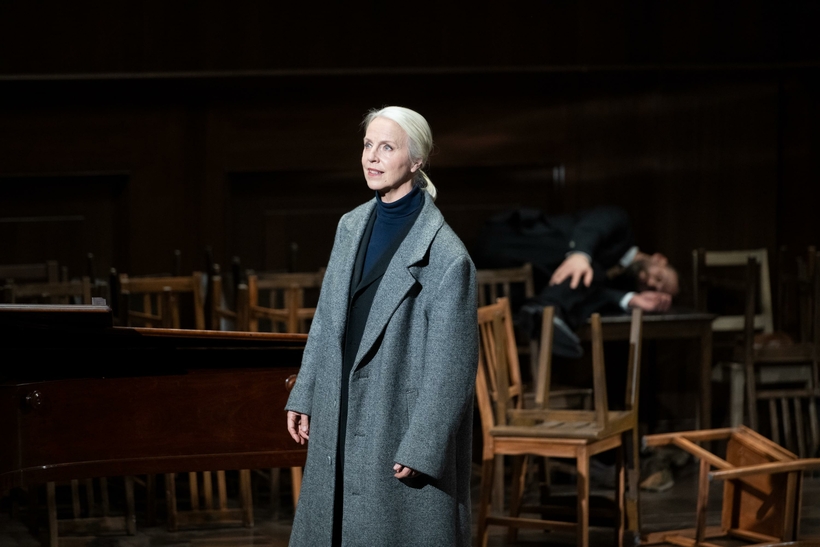Back in May, a stranger turned up in a burgh he liked, found a sweetheart, and got his hopes up. Now snow decks the ground, homey fantasies have turned to ashes, and our wanderer is on the move again, on the road to spiritual erasure. Cue Franz Schubert’s Winterreise (Winter Journey), 24 haunting musical vignettes that trace an arc but tell no story.
As if singing 75 minutes’ worth of Schubert’s bleakest, most numinous songs weren’t challenge enough, classical recitalists today like to lay on theatrical and choreographic embellishments. The Swedish mezzo-soprano Anne Sofie von Otter’s recent deconstruction, captured live at Theater Basel in Switzerland on February 21, 2022, ranks with the most daring of these experiments. Tall, trim, with her white hair tied back in a neat ponytail, Von Otter was 66 at the time of the filming. Yet she held the stage for an unbroken hour and 50 minutes, singing with the transparency and gleam of an artist half that age.
Von Otter’s title—not Winterreise but Eine Winterreise (A Winter’s Journey)—suggests not The Last Word but rather one of any number of possible errands into the composer’s maze. Developed with the German director Christof Loy and the Australian keyboardist Kristian Bezuidenhout, the show justifies the nebulous implications many times over.

Fully 17 of the songs from the Winterreise sequence—that’s 70 percent!—have been tossed, even the iconic first and last. What’s left is shuffled with peak moments from Schubert’s two other major song cycles, unattached songs including the honeyed but desolate floral allegory “Viola,” which runs 15 minutes, and an assortment of choice instrumentals, some with violin.
The “journey” unfolds in a bare wood-paneled assembly hall. Apart from chairs stacked against a wall, there’s a magnificent fortepiano, that forerunner of the modern concert grand of which Bezuidenhout is the grandest and least grandiose of masters. Through glass doors, we glimpse a skeletal tree atop a snowy mound. The set for some unseasonal Waiting for Godot? If so, the allusion is apt. Samuel Beckett revered his Schubert.
Sharing the stage with Von Otter are four mimes and dancers whose significance takes some digging to decode. I’ve done the homework, so let me share. The husky but emotionally fragile bloke, we’re told, stands for the composer’s youthful self. The foxy older man, something of a dandy, is Franz von Schober, perhaps Schubert’s closest intimate and the poet of “Viola.” The symbolic figure of Viola the Violet appears as a Little Match Girl-style ballerina. A Raggedy Anne in a print dress is identified incongruously as The Courtesan, conjecturally alluding to a syphilitic prostitute Schober may have hooked Schubert up with, thereby exposing the composer to the disease that killed him at 31.
That’s some boatload of subtext, fueling no end of fleeting psychodrama on the part of the silent players. Make of all that what you will. Von Otter is playing a more radical and better-focused game. From the vantage of her years, as it were from the far side, she lights ancient heartbreak with a glow of serenity, fading out on a puckish note straight from A Midsummer Night’s Dream. Imagine!
Eine Winterreise is available for streaming on the Naxos Video Library Web site
Matthew Gurewitsch writes about opera and classical music for AIR MAIL. He lives in Hawaii

